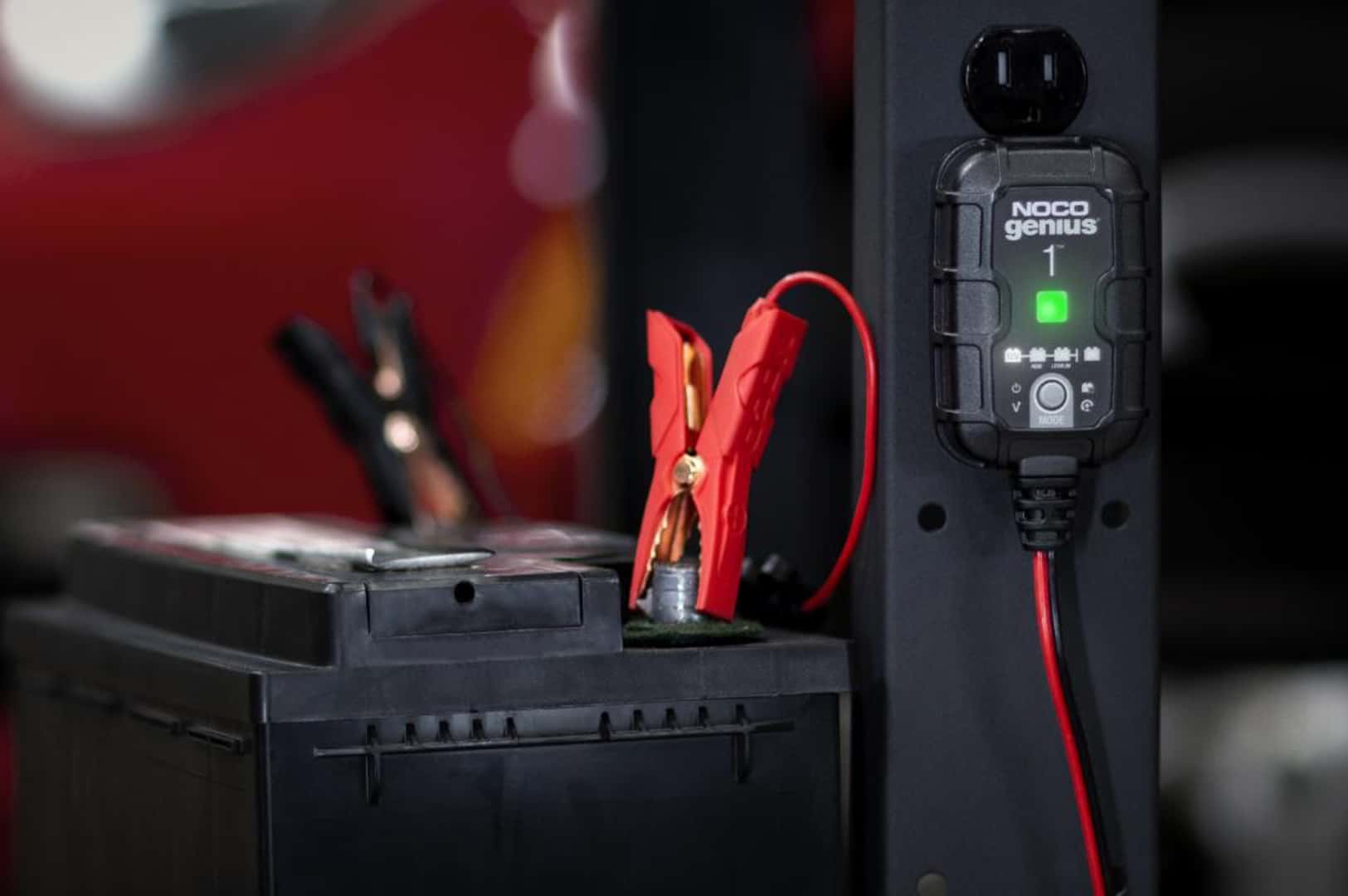Deep cycle batteries are designed to be repeatedly discharged and recharged, making them ideal for a variety of applications, such as RVs, boats, and solar panels. However, to keep your deep cycle battery in good condition, it’s important to use a high-quality charger that can deliver the right amount of power and voltage.
There are many different RV battery chargers on the market, so it can be tough to know which one is right for you. Worry not! We have made your buying process easier by handpicking a list of the best deep cycle battery chargers. There is something for everyone on our list, regardless of your power demand or budget.
If you are new to deep cycle battery chargers, we’ll also cover everything you need to know to make an informed decision. We’ll discuss how a deep cycle battery charger works, the different types of deep cycle battery chargers, the factors to consider when making your purchase, and answers to frequently asked questions. By the end of this guide, you’ll be well-informed about RV deep cycle battery chargers and be able to choose the best one for your needs.
Contents
What is A Deep Cycle Battery Charger?
What it is
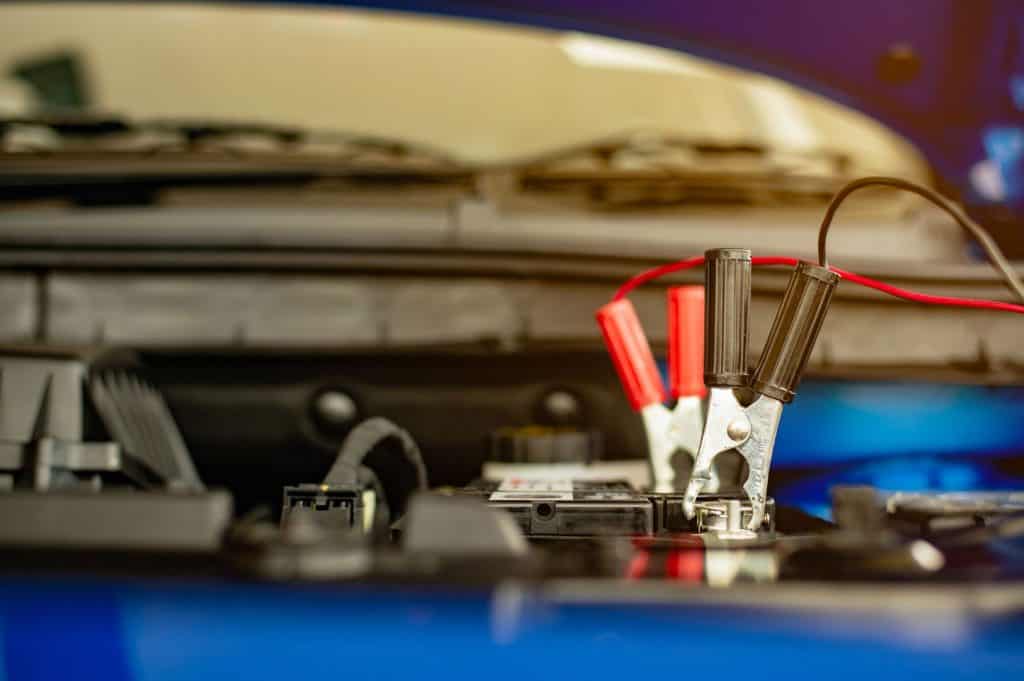
A deep cycle battery charger is a specialized device that used to efficiently and effectively charges deep cycle batteries.
Unlike standard automotive batteries, deep cycle batteries are designed to provide a steady flow of energy over an extended period, making them ideal for applications like RVs, boats, solar power systems, and more.
However, these batteries require a different charging approach than regular batteries, as they are designed to handle deeper discharges and recharges.
A deep cycle battery charger takes into account the unique characteristics of deep cycle batteries, such as their capacity and chemistry, and provides a charging process tailored to their needs.
These chargers typically offer multi-stage charging, which involves different modes like bulk charging, absorption charging, and float charging. This approach ensures that the battery is charged optimally, preventing overcharging or undercharging that could affect its performance and lifespan.
- Bulk charging delivers a high current to quickly charge the battery to around 70-80% of its capacity.
- Absorption charging holds the voltage steady while the current decreases, fully charging the battery and ensuring all cells receive an equal charge.
- Float charging maintains a lower voltage level to keep the battery fully charged without overcharging. It prevents self-discharge and keeps the battery ready to use.
Furthermore, many deep cycle battery chargers come with advanced features like temperature compensation, desulfation modes, and safety mechanisms to enhance battery health and longevity.
For example, temperature compensation ensures that the charger delivers the correct amount of power to the battery, regardless of the ambient temperature. Desulfation modes help to remove sulfate deposits from the battery plates, which can improve battery performance and extend its lifespan. And safety mechanisms like reverse polarity protection and overcurrent protection help to prevent damage to the battery and charger.
Some models also offer compatibility with various battery types, such as AGM, gel, flooded, and lithium-ion batteries. This allows users to select the appropriate charging settings for their specific battery technology.
In essence, a deep cycle battery charger is a crucial tool for maintaining the health and performance of deep cycle batteries. It ensures that they are always ready to deliver reliable power for various applications, whether it’s a weekend camping trip, a boating adventure, or powering an off-grid cabin.
Types of deep cycle battery chargers
There are many different types of deep cycle battery chargers available, each with its own advantages and disadvantages. Some of the most common types include:
- Constant voltage (CV) chargers: These chargers deliver a constant voltage to the battery until it is fully charged. They are simple to use and relatively inexpensive, but they can take longer to charge a battery than other types of chargers.
- Constant current (CC) chargers: These chargers deliver a constant current to the battery until it reaches a certain voltage, then they switch to CV mode. They are more efficient than CV chargers and can charge a battery faster, but they can also be more expensive.
- Multi-stage chargers: These chargers use a combination of CV and CC modes to charge a battery. They are the most efficient type of charger and can charge a battery quickly without damaging it. However, they can also be the most expensive type of charger.
- Automatic chargers: These chargers have a built-in timer that automatically turns off the charger when the battery is fully charged. They are convenient and easy to use, but they can be more expensive than manual chargers.
- Pulsed chargers: These chargers use a pulsing current to charge a battery. They are gentler on the battery than other types of chargers and can help to extend the battery’s lifespan. However, they can also be more expensive than other types of chargers.
How Do Deep Cycle Battery Chargers Work?
Charging method
Deep cycle battery chargers typically use a multi-stage charging process, which involves different voltages and currents at different stages. This helps to extend the life of the battery by preventing overcharging and undercharging.
There are typically 3 main stages of charging including bulk charging, absorption charging, and float charging.
Bulk charging:
The initial stage of charging is bulk charging, where the charger delivers a high current to quickly replenish the battery’s charge. During this stage, the voltage is kept constant while the battery rapidly absorbs the charge.
The goal of this stage is to charge the battery to around 70-80% of its capacity. It’s the fastest charging stage and is useful for bringing a deeply discharged battery to a reasonable charge level.
Absorption charging:
After bulk charging, the charger transitions to absorption charging. In this stage, the voltage remains constant, but the current decreases as the battery’s state of charge increases. The goal of absorption charging is to fully charge the battery and ensure that all cells receive an equal charge.
The charger holds the voltage steady, allowing the battery to absorb the remaining charge more slowly. This helps prevent overcharging and ensures that the battery’s capacity is maximized.
Float charging:
Once the battery is fully charged, the charger switches to float charging. During this stage, the charger maintains a lower voltage level, which is typically around the battery’s nominal voltage. This voltage is sufficient to keep the battery fully charged without causing any overcharging.
Float charging is a maintenance mode that prevents the battery from self-discharging and maintains it in a ready-to-use state. It’s particularly useful for applications where the battery is continuously connected and needs to be available for use at any time.
In contrast, regular battery chargers use a simple, single-stage charging process. They charge the battery from beginning to end without interruption. The charging current remains relatively constant throughout the process. When the battery is fully charged, the charger automatically shuts off.
Related Reviews: Best RV Solar Battery Chargers
Charging time
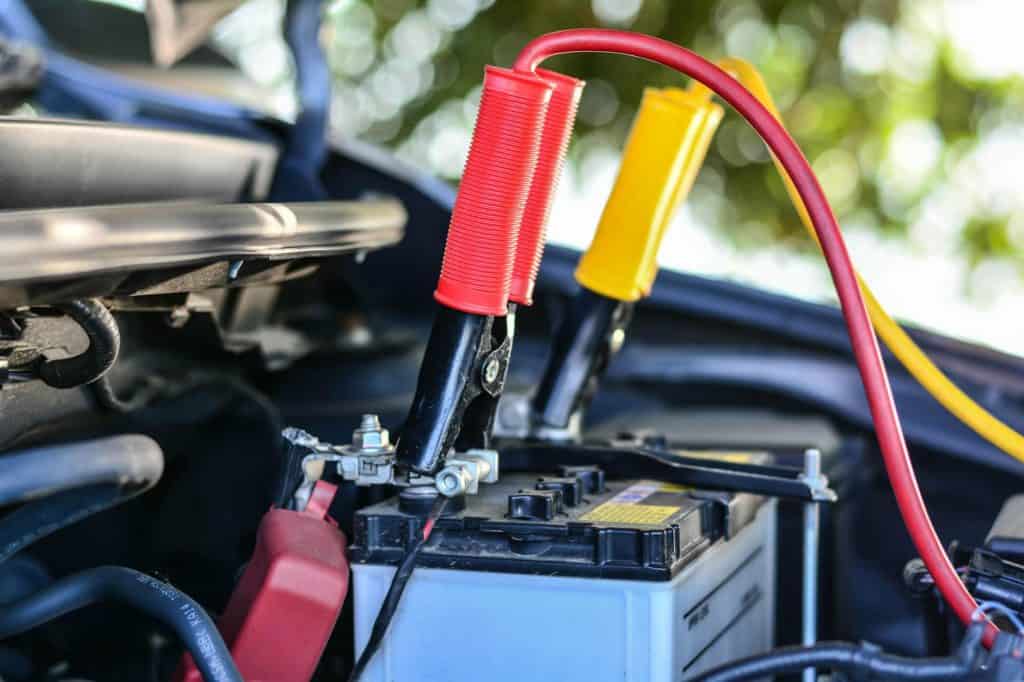
The biggest difference between regular battery chargers and deep cycle chargers is the charge speed. Deep cycle battery chargers use a multi-stage charging process to ensure optimal battery health and longevity. This process includes bulk charging, absorption charging, and float charging, resulting in longer charging time. It can take several hours to fully charger a deep cycle battery.
Regular battery chargers, on the other hand, typically use a constant current and voltage throughout the charging cycle to quickly charge batteries. This approach can be efficient for smaller batteries, but it may not provide the same level of care for deep cycle batteries. Fast charging with regular chargers can generate excessive heat and potentially lead to a shorter battery lifespan.
The best deep cycle battery chargers use a slow charging process to minimize internal resistance, prevent excessive heat buildup, and ensure optimal charging capacity. This allows the battery to effectively reach its full capacity, which helps to maximize its lifespan.
Safety features
Deep cycle battery chargers offer a range of advanced features that traditional battery chargers don’t. These features can help extend battery life, prevent damage, and make charging easier.
- Reverse polarity protection: This feature prevents potential damage by detecting incorrect battery terminal connections. If the positive and negative terminals are mistakenly reversed, the charger will automatically halt the charging process to avoid damage.
- Temperature compensation: Deep cycle battery chargers often have temperature sensors, which automatically adjust the charging voltage and current according to the ambient temperature, preventing damage caused by excessive heat.
- Short-circuit protection: Deep cycle battery chargers incorporate mechanisms that detect short circuits. In the event of a short circuit, the charger will shut down to prevent overheating, electrical hazards, and potential damage to the battery.
- Overcharge protection: Quality deep cycle battery chargers employ overcharge protection to monitor the battery’s voltage and adjust the charging current as the battery approaches its full capacity, preventing overcharging.
- Built-in battery tester: Some advanced chargers come with a built-in battery tester that assesses the battery’s condition before initiating the charging process. This diagnostic feature ensures that only healthy batteries are charged and helps avoid potential issues.
- Automatic shut-off: Once the battery is fully charged, the charger will automatically switch to a maintenance or float mode to avoid overcharging.
- Desulfation mode: Deep cycle battery chargers with desulfation modes use specialized charging algorithms to break down sulfate buildup on the battery plates. This helps revive and extend the life of older or sulfated batteries by improving their overall performance.
Why Should We Use Deep Cycle Battery Chargers?
If you have deep cycle batteries, it is important to use a deep cycle battery charger to charge them. Regular battery chargers deliver a high amperage charge, which can cause the battery to heat up. This heat can damage the battery’s internal components and shorten its lifespan.
Additionally, regular battery chargers do not provide the same level of charging control as deep cycle battery chargers. This can lead to overcharging, which can also damage the battery. That’s why it’s not recommended to use a traditional charger to charge a deep cycle battery.
Here are the specific reasons to use a deep cycle battery charger:
Extend battery lifespan: Deep cycle battery chargers prolong the life of your batteries by delivering the right charging profile and preventing overcharging or undercharging. This maximizes the efficiency and durability of your batteries, leading to fewer replacements and reduced maintenance costs.
Maintain electrical appliances: When you’re on the road or off-grid, a high-quality deep cycle battery charger ensures that your RV’s battery bank remains fully charged, so you can power your appliances without compromise. This way, you can enjoy all the comforts of home even in remote locations.
Ensure the health of your electrical parts: Depleted batteries can put strain on your vehicle’s charging system, potentially damaging critical components like the alternator and starter motor. By using a deep cycle battery charger, you can regularly charge and maintain your batteries, preventing excessive voltage draw and subsequent electrical malfunctions.
Condition your batteries: A top-tier 12V deep cycle battery charger provides battery conditioning, a maintenance process that keeps your battery in optimal condition during charging. Smart chargers may include testing lights to visually monitor battery health. Traditional chargers may lack this technology, making a quality deep cycle battery charger a valuable asset.
Convenient charging: Having a deep cycle battery charger on hand means you can recharge your batteries yourself, saving you time and money. You can also ensure your batteries are always ready for use, without having to rely on professional mechanics or shops.
Enhance travel flexibility: A deep cycle battery charger gives you the freedom to explore new destinations without worrying about battery power. You’re no longer restricted to routes with charging services, so you can experience the great outdoors on your terms.
Optimize efficiency: The best deep cycle battery chargers are designed to deliver optimal efficiency. They provide the right charge at the right time, preventing energy waste and ensuring your batteries are ready to perform when needed. This efficiency translates to better battery performance and prolonged usage.
5 Best Deep Cycle Battery Chargers: In-depth Reviews
In this review, we’ll take a look at 5 of the best deep cycle battery chargers available on the market. Read our deep cycle battery charger reviews below and choose the one that’s right for your needs.
1. Battery Tender Plus 12V Deep Cycle Battery Charger
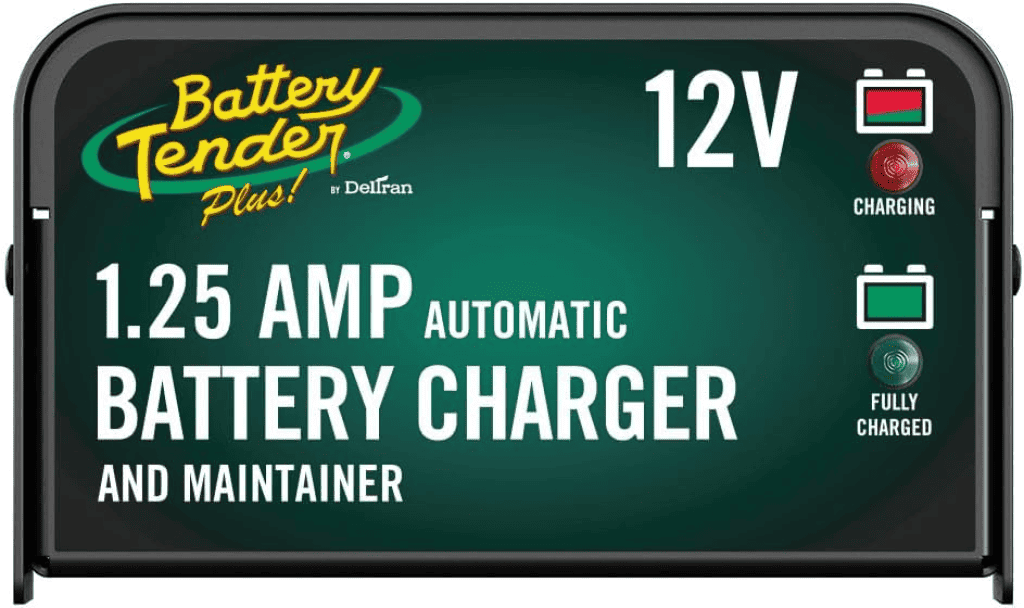
The Battery Tender Plus 12V Deep Cycle Battery Charger is a versatile and reliable charging solution that keeps your powersports vehicle’s battery in optimal condition. It has advanced features and a user-friendly design, making it one of the best RV battery chargers – a must-have for RVers.
Smart charging feature: One of the standout features of the Battery Tender Plus is its intelligent charging process. It provides a full charge to your battery before switching to float mode, which maintains proper voltage levels for safe, long-term storage without the risk of overcharging. This means that your battery remains in peak condition, ready for action when you are.
Easy to use: This 12V deep cycle battery charger is designed with user convenience and safety in mind. Its low-maintenance design makes it quick and easy to use. Once you connect the Battery Tender Plus to your battery, it will start to charge and maintain its power automatically. There is no need to monitor the charger or adjust any settings.
Advanced safety features: The charger’s safety features protect your battery and prevent accidents. Reverse polarity protection prevents the charger from sending current to the battery unless the connections are properly attached. This helps to prevent sparks and fires. The quick disconnect harness makes it easy to remove the charger from the battery without having to disconnect the wires. And the spark-proof design ensures that no current is sent to the battery until the charger has detected a voltage signal.
Clear indicators: A solid-state two-color LED light indicates the state of the charge. Green means the battery is fully charged, yellow means the battery is in the process of charging, and red means the battery is low and needs to be charged.
If the battery voltage drops too far under load, the charger will automatically resume full charger output power. This ensures that your battery remains well-maintained and ready for use.
2. BLACK+DECKER BM3B Fully Automatic 6V/12V Battery Charger
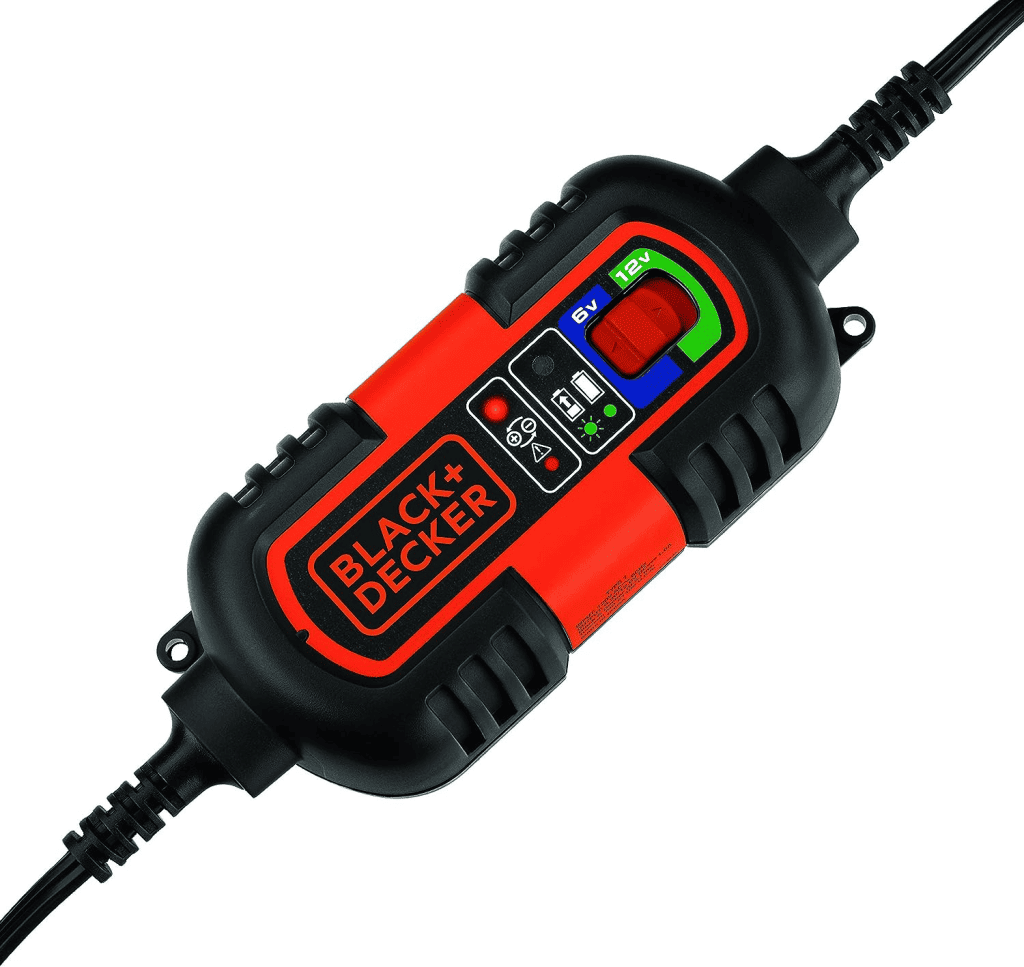
The BLACK+DECKER BM3B Fully Automatic 6V/12V Battery Charger is another versatile and user-friendly RV deep cycle battery charger money can buy.
Both 6V and 12V compatible: The BM3B’s compatibility with both 12V and 6V RV batteries makes it an ideal choice for a range of vehicles and applications. Whether you have a car, truck, boat, or RV, the BM3B can keep your battery in peak performance.
Easy and flexible connection: The BM3B’s multiple connection options make it easy to connect to your battery, regardless of your setup. You can choose between battery clips, O-ring terminals, or even the vehicle’s DC plug for direct connection. This versatility allows you to easily swap connections between battery clamps and ring terminals, providing flexibility based on your needs and setup.
AC low voltage compensation: The BM3B charger ensures maximum performance, even when used with an extension cord. Its AC Low Voltage Compensation feature makes up for the loss of voltage that may occur when using an extension cord, ensuring that the charger delivers optimal results every time.
Smart charging technology: The BM3B is also a fully automatic battery charger, which means that it does not require any user input. Simply connect the charger to your battery and it will begin charging automatically. The BM3B will also monitor the battery and automatically adjust the charging voltage as needed. With high-frequency smart charging technology, the BM3B charger keeps your batteries at their optimal charge level. It automatically switches between charging mode and float mode to maintain your batteries without the risk of overcharging.
The charging status indicator makes it easy to monitor the charging process, providing you with a quick and easy view of the charger’s operation. The charger’s built-in polarity protection also ensures that jumper cables are connected correctly, enhancing safety during use.
3. NOCO GENIUS1 Smart Battery Charger
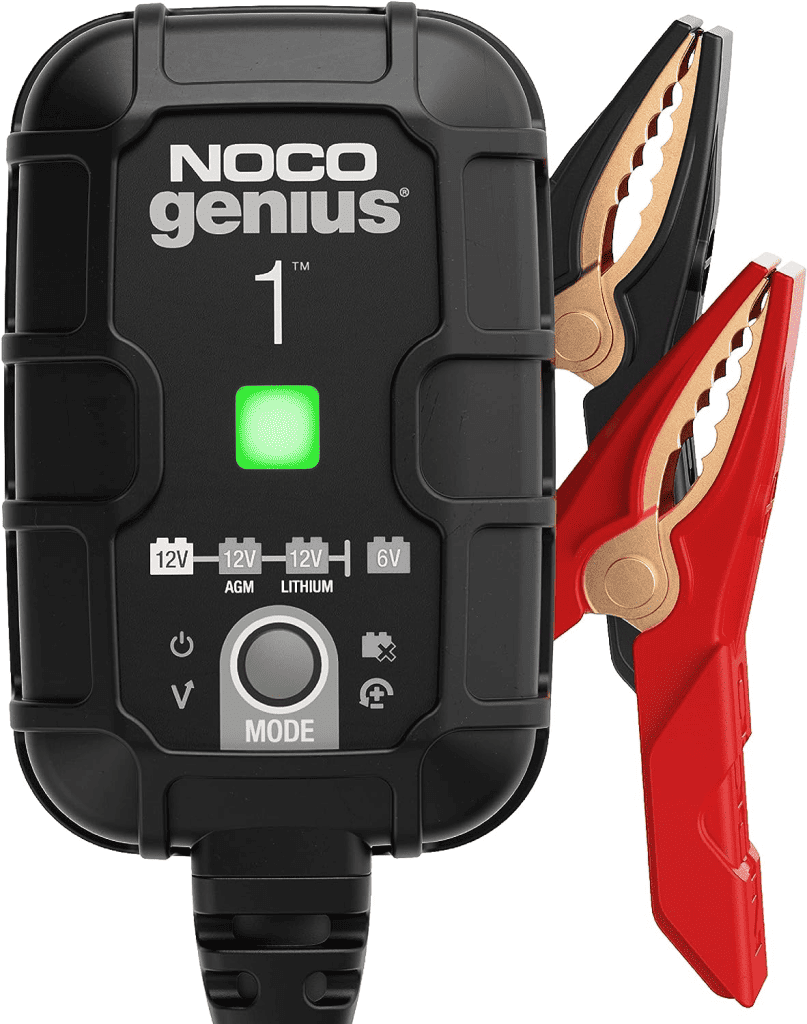
The NOCO GENIUS1 Smart Battery Charger sets a new standard in battery maintenance and charging with its innovative features and advanced technology. It has everything you need from the best deep cycle battery charger.
More than a battery charger: The GENIUS1 is more than just a battery charger. It is also an RV trickle charger, a battery maintainer, a float charger, and a battery desulfator. This makes it suitable for a wide range of battery types and conditions, including standard 12V batteries, AGM batteries, lithium batteries, and 6V batteries.
A smart charger: The GENIUS1 is fully automatic, so you can enjoy worry-free charging 24/7. It has a zero overcharge feature that protects your battery from damage, even during prolonged charging periods. This smart deep cycle battery charger takes the guesswork out of charging and maintenance.
Optimized charging with thermal sensor: The GENIUS1’s integrated thermal sensor is a major breakthrough in battery charging technology. It senses the surrounding temperature and adjusts the charging process accordingly, preventing overcharging in hot conditions (up to 104°F) and undercharging in cold environments (down to -4°F). This ensures that your battery receives the optimal charge, no matter what the weather.
Five different charging modes: The GENIUS1 offers five different charging modes to suit a variety of battery types and conditions. Whether you have a standard 12V battery, an AGM battery, a lithium battery, or even a 6V battery, the GENIUS1 has you covered. The Force Mode allows you to manually charge batteries that have been depleted to as low as 1-volt. This level of customization and control sets the GENIUS1 apart from traditional chargers.
Restore dead batteries: One of the most impressive features of the GENIUS1 is its ability to revive dead batteries. The charger’s advanced battery repair mode uses slow pulse reconditioner technology to detect and address battery sulfation and acid stratification, two common causes of battery failure. By addressing these issues, the GENIUS1 can restore lost battery performance, resulting in a longer battery lifespan and smoother engine starts.
4. Schumacher SC1281 6/12V Fully Automatic Battery Charger
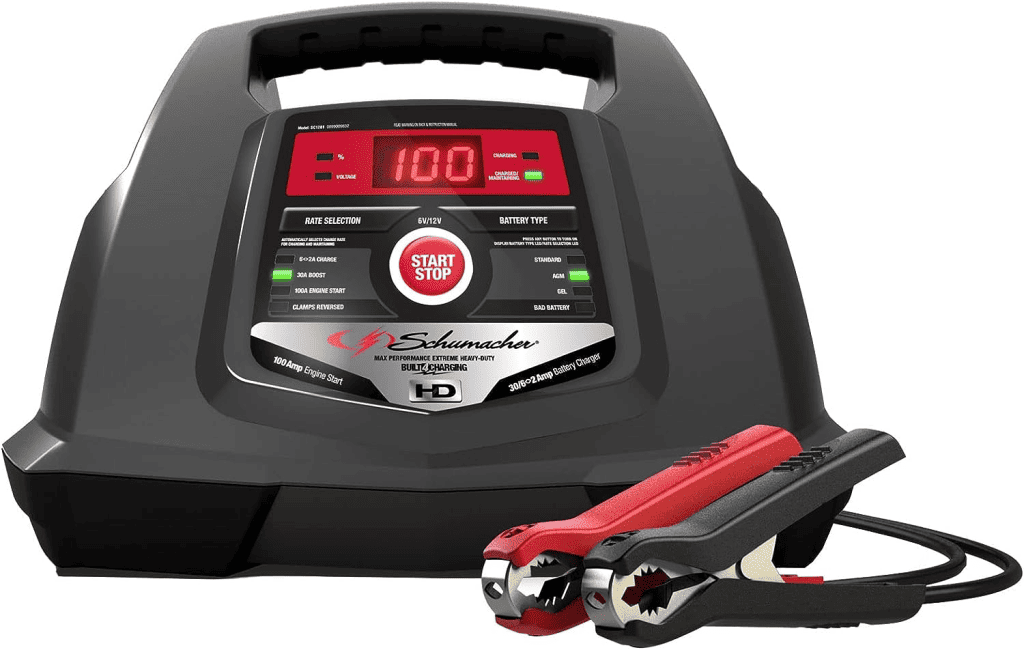
The Schumacher SC1281 Battery Charger is a great option for those who need a powerful battery charger for deep cycle charging needs.
The SC1281 Battery Charger sets itself apart with remarkable 100A jump-starting power. When faced with deeply discharged batteries, its 30A boost mode comes into play, swiftly breathing life back into them. This quick revival feature is a game-changer, ensuring you’re not left stranded due to a drained battery.
The integrated battery and alternator tester is a great diagnostic tool. It not only allows you to check the battery’s charge level but also can help you determine if your battery is bad or if there is a problem with your alternator.
Ease of use is paramount with the SC1281. Its fully automatic nature ensures that once a battery reaches full charge, the charger will seamlessly transition into maintain mode. This thoughtful automation safeguards your battery against overcharging while keeping it in optimal condition.
The SC1281 employs a sophisticated multi-stage charging algorithm that guarantees your battery remains in peak condition. This approach not only ensures efficient charging but also extends the overall lifespan of your battery, making it a sound investment in the long run.
In float mode, the SC1281 becomes an efficient battery maintainer. It consistently delivers a small current to keep the battery fully charged without overloading it. This smart functionality prevents battery deterioration during periods of non-use, making it ideal for vehicles and equipment in storage. Its reverse hook-up protection feature prevents damage in case of accidental clamp reversal, ensuring both your battery and the charger remain unharmed.
5. TowerTop 2/10/25 Amp 12V Smart Battery Charger
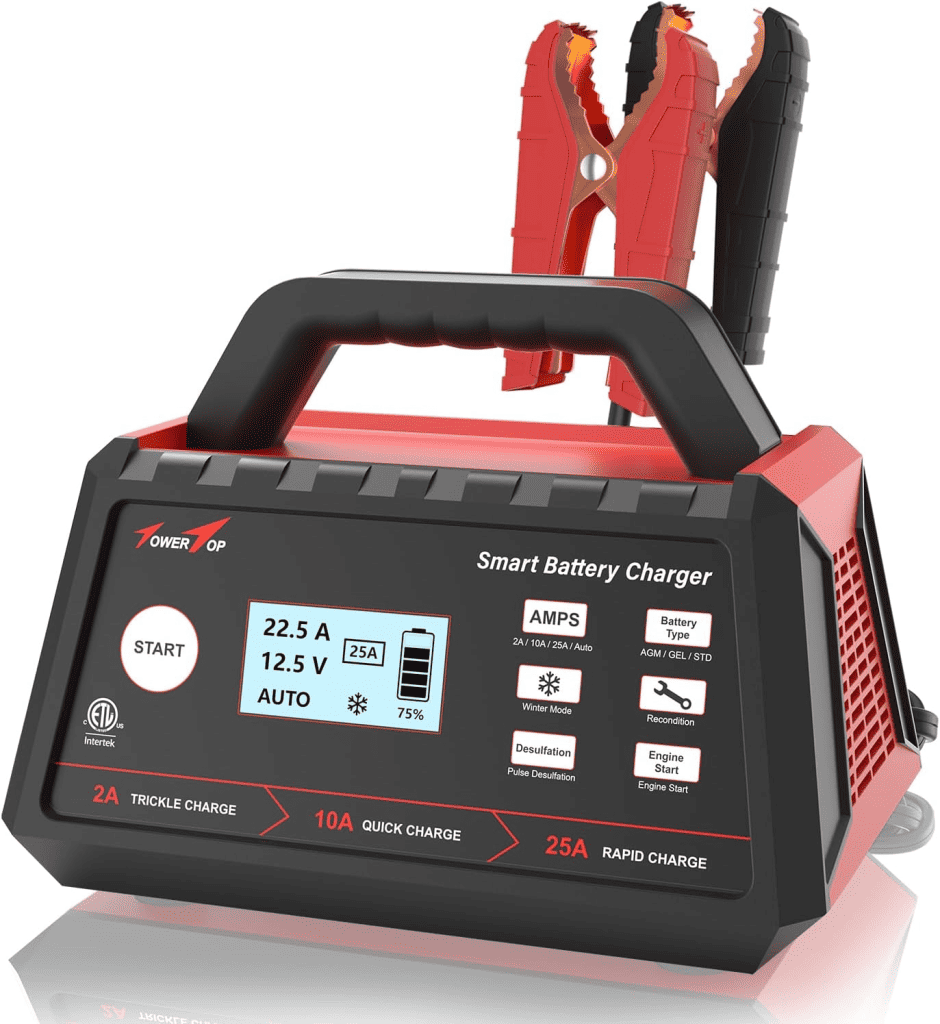
Last but not least, I would like to mention the TowerTop 12V smart battery charger. If you’re looking for the best battery charger for deep cycle batteries, you should not skip this option.
The TowerTop Charger’s intuitive design makes charging a breeze. It automatically identifies and initiates charging, even if you forget to press start. If AC power fails during a long charging session, the charger’s memory will retain your settings, giving you peace of mind.
An MCU controller oversees the entire charging process, enhancing accuracy and prolonging battery life. The TowerTop Charger’s 8-stage charging process expertly manages battery power, ensuring efficient and effective charging.
With its 1V low-voltage detection, the TowerTop Charger becomes a lifeline for deeply-discharged batteries. It detects and revives batteries down to 1-volt, rescuing them from potential obsolescence.
This charger’s intelligent temperature control adds an extra layer of efficiency. The fan operates to optimize performance when the charger is in constant current and constant voltage stages. Additionally, the Winter Mode slightly increases charging voltage in cold weather, promoting battery activity even in frigid conditions.
The TowerTop Charger’s advanced reconditioning mode uses innovative slow pulse reconditioner technology to detect battery sulfation and acid stratification. This mode effectively restores lost battery performance, making it an invaluable tool for reviving old or idle batteries and extending their lifespan
This smart deep cycle battery charger comes with a variety of safety features, including short circuit protection, spark protection, reverse polarity protection, overcharge protection, over-voltage protection, and overheating protection. The charger is also ETL/BC/FCC certified and backed by an 18-month warranty, so you can be confident in its safety and performance.
The TowerTop Charger’s ABS shell is remarkably impact-resistant, flame-retardant, and corrosion-resistant. It is also lightweight and ergonomically designed, with a flexible handle for easy portability. This makes it a valuable addition to any automotive toolkit.
RV Battery Charger Buying Criteria
Battery Compatibility
Battery compatibility is essential when choosing a deep cycle battery charger. Not all chargers are compatible with all types of batteries, and using the wrong charger can lead to ineffective charging, battery damage, or even safety hazards. Here are some things to keep in mind about battery compatibility:
- Battery types: Deep cycle battery chargers are designed for specific types of batteries, such as lead-acid, AGM (Absorbent Glass Mat), gel cell, lithium-ion, and more. Make sure the charger is compatible with the type of battery you have.
- Voltage compatibility: Deep cycle batteries come in various voltages, such as 6V, 12V, or 24V. Make sure the charger’s voltage output matches the voltage of your battery. Using an incorrect voltage charger can damage the battery.
- Capacity range: Chargers often have a specified range of battery capacities they can effectively charge. Make sure the charger’s capacity range matches the capacity of your battery. Overcharging or undercharging can reduce battery performance and lifespan.
- Multi-battery support: Some chargers can charge multiple batteries simultaneously. If you have a battery bank with multiple deep cycle batteries connected in series or parallel, make sure the charger can handle this configuration.
- Automatic detection: Chargers with automatic battery type detection can adjust their charging parameters based on the battery’s chemistry, voltage, and capacity. This ensures optimal and safe charging without user intervention.
Smart Technology
Smart technology in deep cycle battery chargers refers to advanced features that enhance the charging process, improve battery health, and ensure safety.
These intelligent chargers usually feature microprocessors, sensors, and algorithms to monitor and control the charging cycle in a precise and efficient manner.
Here are some advanced features in smart deep cycle battery chargers:
- Multi-stage charging: This optimizes charging efficiency, prevents overcharging, and extends battery life.
- Voltage and temperature compensation: This ensures accurate and safe charging in various conditions.
- Battery type recognition: This ensures optimal charging without damaging the battery.
- Desulfation mode: This extends battery life and improves performance.
- Diagnostic functions: This identifies potential issues and extends battery life.
- Safety protections: These protect the battery and charger from damage.
- Maintenance mode: This keeps the battery at its optimal level without overcharging.
Portability
Portability is an important factor to consider when choosing a deep cycle battery charger, especially for those who need to charge batteries on the go or in various locations.
A portable charger is easy to carry and store, and it can be used in a variety of situations. Here are some aspects to consider when choosing a portable deep cycle battery charger:
- Size and weight: Smaller and lighter chargers are easier to carry and store.
- Carrying handle or strap: A carrying handle or strap makes it easier to transport the charger.
- Cable management: Built-in cable storage or cord wraps help keep the cords organized.
- Cord length: The length of the power cord and battery cables should be long enough to reach the battery.
- Sturdy construction: A durable charger can withstand transportation without being easily damaged.
- Carrying case: A carrying case protects the charger during transportation.
- Mounting options: Chargers with mounting brackets or holes can be secured in a convenient location.
- Universal compatibility: A charger that is compatible with a variety of battery types and sizes is more versatile.
- Built-in storage: Built-in compartments or pockets for storing cables and accessories keep everything organized.
- AC/DC options: A charger that can be powered by both AC and DC sources is more flexible.
- Foldable or detachable components: Foldable or detachable components make the charger more compact and easy to transport.
Brand
NOCO: NOCO is well-known for its innovative technology and high-quality chargers. The brand offers a range of smart chargers with various features like multi-stage charging, safety protections, and compatibility with different battery types.NOCO chargers are known to be durable and long-lasting.
Battery Tender: Battery Tender is renowned for its reliable and efficient battery maintenance solutions. Their chargers often come with a variety of features like float charging, reverse polarity protection, and built-in battery testers to protect your battery.
Schumacher: Schumacher has been in the battery charger business for over 60 years. This company produces a wide range of chargers, including models specifically designed for deep cycle batteries. They offer options with multiple charging modes, boost functions, and advanced diagnostics. Schumacher chargers are known to be reliable and affordable, making them a good option for budget-minded buyers.
BLACK+DECKER: This brand offers a range of battery maintenance products, including deep cycle battery chargers. Their chargers often come with intelligent charging algorithms, multiple connection options, and safety features.
TowerTop: TowerTop is known for producing smart battery chargers with advanced features like auto-identification, temperature control, and reconditioning modes.
Price
The cost of a deep cycle battery charger can vary widely, depending on factors like brand, features, charging capacity, and overall quality.
- Basic models with fewer features may start around $30 to $50.
- Mid-range chargers with additional features like multiple charging modes, safety protections, and compatibility with various battery types can range from $50 to $150.
- High-end deep cycle battery chargers with advanced smart technology, multiple charging stages, built-in battery testers, and other premium features can cost anywhere from $150 to $300 or more. These chargers often offer greater precision, convenience, and battery care capabilities.
It’s important to note that investing in a quality charger is worthwhile to ensure the longevity and health of your deep cycle batteries. Spending a bit more on a reliable charger can help you avoid potential battery damage and the need for premature replacements.
